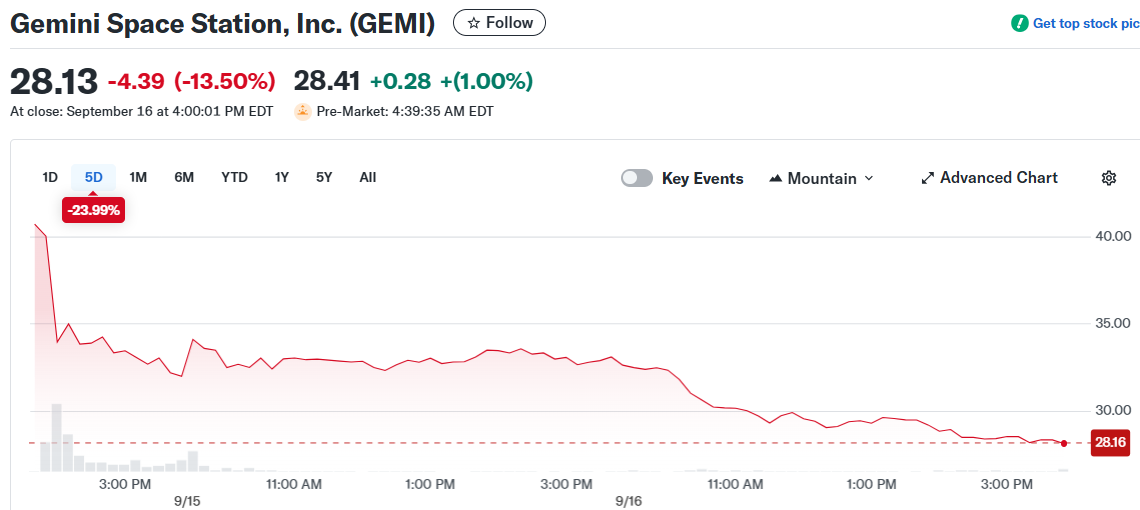TLDR
- Gemini shares dropped 6% on Tuesday, extending post-IPO losses to 24% since Nasdaq listing
- Crypto exchange posted $283 million net loss in first half 2025, doubling from 2024’s full-year loss
- Stock trades at expensive 26x revenue multiple while competitors remain stable
- Circle gained 13% and Coinbase stayed flat during Gemini’s decline
- Initial IPO enthusiasm faded as investors scrutinize profitability concerns
Gemini cryptocurrency exchange shares tumbled 6% on Tuesday, bringing total losses to 24% since the company’s Nasdaq debut last Friday. The Winklevoss brothers’ trading platform now trades at $30.42, well below its first-day peak of $45.89.

The crypto exchange raised $425 million through its initial public offering, pricing shares at $28 and achieving a $3.3 billion market valuation. Early trading momentum pushed the stock to a 64% gain on debut day before the recent selloff erased most gains.
Gemini’s stock performance contrasts sharply with other crypto-related companies. Coinbase, the largest U.S. cryptocurrency exchange, remained flat over the past week. Circle Internet Group gained 13% during the same period, trading at $135.75 per share.
Financial Losses Drive Investor Concerns
The company’s deteriorating financial performance weighs heavily on investor sentiment. Gemini reported a $283 million net loss for the first half of 2025, nearly doubling the $159 million loss recorded for all of 2024.
These mounting losses come despite the company’s established position in the cryptocurrency trading market. Founded by Cameron and Tyler Winklevoss, Gemini operates as a regulated digital asset exchange competing with platforms like Coinbase and Kraken.
Revenue growth has also slowed, making the stock’s premium valuation difficult to justify. The exchange faces intense competition from established players while struggling to achieve profitability in a volatile crypto market.
Valuation Concerns Mount
Compass Point analyst Ed Engel noted Gemini trades at 26 times its annualized first-half revenue. This price-to-sales multiple far exceeds industry averages of 4 times revenue and peer group averages of 3.2 times.
The steep valuation becomes problematic for an unprofitable company in a volatile sector. Engel calculated a fair value of $32.52 per share, suggesting current prices may not reflect underlying business fundamentals.
For comparison, investors pay $26 for every dollar of expected annual revenue from Gemini. This premium pricing typically requires strong growth prospects or clear paths to profitability that the company has yet to demonstrate.
Market Competition Remains Fierce
The broader cryptocurrency exchange sector shows mixed performance during Gemini’s decline. Robinhood, which generates crypto trading revenue, fell 3% over the week despite beating analyst expectations with $989 million in quarterly revenue.
Coinbase posted weaker results, with $1.50 billion in quarterly revenue falling short of expectations by 4.3%. The platform reported 8.7 million monthly active users, missing analyst estimates and contributing to a 13.3% post-earnings decline.
Circle Internet Group bucked the trend with strong performance, showing an 11.48% one-month return despite losing 17.04% over three months. The stablecoin issuer continues benefiting from increased demand for digital dollar tokens.
The divergent performance across crypto stocks suggests Gemini’s struggles stem from company-specific issues rather than broader sector weakness. Investors appear focused on individual company fundamentals and paths to profitability.





